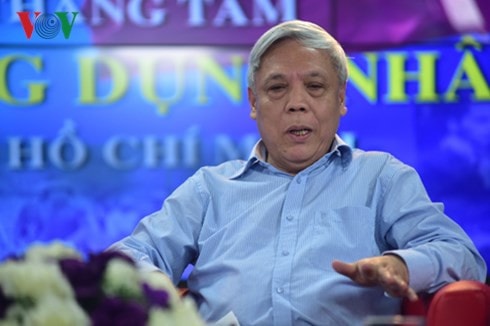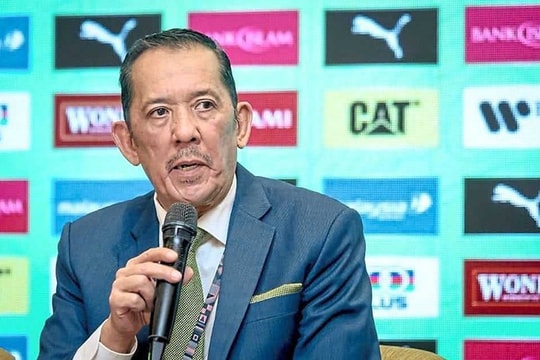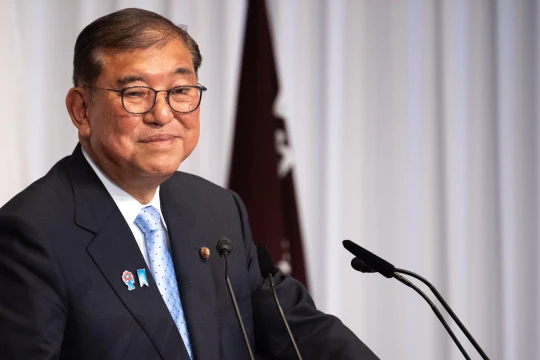Resignation must be regulated by the legal system.
Associate Professor Dr. Nguyen Trong Phuc said that resignation needs to be regulated by the legal system to be taken seriously.
At the recent Government meeting, Prime Minister Nguyen Xuan Phuc asked Government members to discuss measures to implement the promises made to the National Assembly at the question and answer session with the spirit that words must go hand in hand with actions. The Prime Minister gave an example: Is there a culture of resignation? Is there a Decree on this issue? Who will do it? It is the Ministry of Home Affairs that must do it and submit it to the Government. How should we change so that the culture of resignation is comfortable, easy to do, and easy to implement?
On this issue, the reporter interviewed Associate Professor, Dr. Nguyen Trong Phuc, former Director of the Institute of Party History - Ho Chi Minh National Academy of Politics.
 |
| Associate Professor, Dr. Nguyen Trong Phuc (Photo: Quang Trung). |
PV: When answering questions before the National Assembly, Prime Minister Nguyen Xuan Phuc emphasized that he would remove corrupt officials from the apparatus and implement a culture of resignation. What do you think about the Prime Minister's answer?
Associate Professor, Dr. Nguyen Trong Phuc: In my opinion, this is the first time the Prime Minister has spoken frankly before the National Assembly forum about the issue of selecting and appointing officials and being ready to remove from the apparatus those officials who do not meet the requirements of the country's development and management in the current situation of innovation. The Prime Minister's opinion also demonstrates the political determination of the Party Central Committee, the Politburo and the Government. If that determination is implemented in practice, it will certainly bring about fundamental changes in the current administrative reform as well as the entire reform of the state apparatus.
PV: It can be seen that the political determination is very strong, the people know whether the cadres are good or bad. So why have we not dealt with this group of weak cadres well for a long time, sir?
Associate Professor, Dr. Nguyen Trong Phuc: We have known for a long time that a number of cadres and civil servants, including leaders and managers, are weak, but dealing with them is a very difficult problem. Many times, the process of handling cadres and civil servants in a timely manner depends on the entire general cadre work process of the Party. That is also a point to note.
In the coming time, we need to improve and innovate the work of cadres, including the Party, the State apparatus and the entire political system in a synchronous manner to be able to solve the problem. We aim to build a state of law, so the legal system has a very important meaning in governing the selection of cadres.
Later, based on that legal document to implement, it will quickly meet the requirements of practical leadership and management in the state apparatus, otherwise it will be very slow. Because the law is also the crystallization of the Party's viewpoints and policies and the will of the people, if we go straight into implementing the provisions of the law, we will quickly solve problems that are sometimes known but are very slow to handle.
PV: One of the steps to remove incompetent officials from the system is to ask for their resignation. What is your opinion on this issue?
Associate Professor, Dr. Nguyen Trong Phuc: Resignation is a culture and it should be considered normal, a step in state leadership management. Historical research shows that in feudal times, there were also resignations because people were dissatisfied with the chaos of the bureaucracy. Now people resign because they do not complete their tasks or are not capable of completing their tasks or taking responsibility for their work. In the history of our Party, there have also been resignations.
Resignation is not a completely new issue. The reason why the culture of resignation has not become popular compared to other countries is because, psychologically, those who are appointed to positions are psychologically influenced by family, friends, colleagues, superiors, and subordinates. Therefore, having the courage to accept responsibility and resign is not an easy thing for each leader and manager.
Second, positions and powers are often linked to benefits, so giving up material benefits is not easy. Third, in our country, people are not used to resigning, so it feels like a heavy issue.
Those who resign should also be fully evaluated for their character. If they feel they have not fulfilled their duties or are not capable of fulfilling their duties and resign, then that action should be highly appreciated. In my opinion, resignation is an honorable withdrawal for leaders and managers.
PV: In addition to the above reasons, the laws and regulations regarding the responsibilities of leaders seem to be general, so the culture of resignation is therefore rare, don't you think?
Associate Professor, Dr. Nguyen Trong Phuc: The law on civil servants and public employees as well as the entire legal system have provisions on this matter, but they are still general and unclear in which cases one should resign. Resolution 4 of the 11th Central Committee also mentions the responsibility of the leader, however, in practice so far, how many leaders in agencies, units, sectors and localities have been disciplined for not performing their responsibilities properly is unclear.
PV: Whether the work of personnel and the removal of degenerate or resigned officials from the apparatus is carried out or not, the important thing is still the leader, sir?
Associate Professor, Dr. Nguyen Trong Phuc:The determination of the General Secretary, the Chairman of the National Assembly, the Prime Minister, the head of the judiciary… in this term is very high. All the determination of the leaders needs to be turned into action and there must be specific steps and regulations.
Therefore, it is necessary to assign specialized agencies to research and propose truly effective measures and solutions in practice, while at the same time maintaining the unity and development of the apparatus.
Reporter: At the recent regular Government meeting, the Prime Minister asked members of the Government to discuss measures to fulfill the promise to the National Assembly on this content and the Ministry of Home Affairs must do this. In your opinion, how should we change to make the culture of resignation more pleasant, easier to do, and easier to implement?
Associate Professor, Dr. Nguyen Trong Phuc: The Ministry of Home Affairs must advise the Prime Minister and the Government to complete the regulations not only in the Party Resolution but also in the legal system. For example, the Law on Civil Servants and Public Employees, the Law on Organization of the Government and the National Assembly need to have a point: all comrades holding important positions, leadership and management positions at all levels who fail to fulfill their duties must resign. Here, the words "must", "for", "should" resign need to be used carefully in legal language. Legislators and managers should thoroughly research and include them in legal documents. Only on the basis of legal documents, Laws, and specific instructions such as Decrees and Circulars can they be seriously implemented.
PV: Thank you./.
According to VOV
| RELATED NEWS |
|---|








